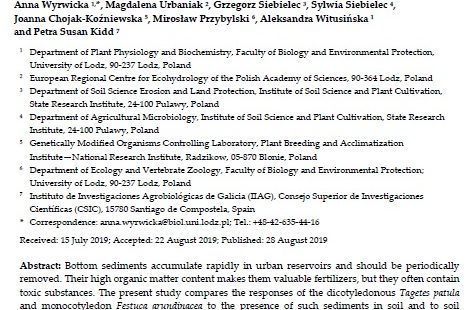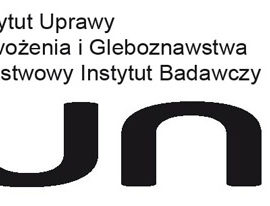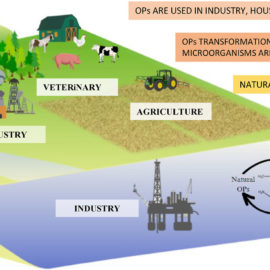Wyrwicka A., Urbaniak M., Siebielec G., Siebielec S., Chojak-Koźniewska J., Przybylski M., Witusińska A., Kidd P.S. (2019) The influence of bottom sediments and inoculation with rhizobacterial inoculants on the physiological state of plants used in urban plantings. Water, 11, 1792.
LINK DO PUBLIKACJI: https://www.mdpi.com/2073-4441/11/9/1792
Abstract
Bottom sediments accumulate rapidly in urban reservoirs and should be periodically removed. Their high organic matter content makes them valuable fertilizers, but they often contain toxic substances. The present study compares the responses of the dicotyledonous Tagetes patula and monocotyledon Festuca arundinacea to the presence of such sediments in soil and to soil inoculation with two rhizobacterial strains (Massilia niastensis p87 and Streptomyces costaricanus RP92) isolated from contaminated soil. Total soluble protein, total chlorophyll content, as well as chlorophyll a/b ratio, degree of lipid peroxidation (TBARS), α-tocopherol content, total phenolic compounds (TPC) content and anthocyanins content were examined in the leaves of investigated plants. T. patula was more sensitive to the toxic substances in the sediments than F. arundinacea. Rhizobacterial inoculation reduced the toxic effect of the sediment. RP92 has a more favorable effect on the condition of T. patula than p87. F. arundinacea was not adversely affected by the addition of sediments or inoculation with the p87 or RP92 strains. Both tested plant species are suitable for planting on soils enriched with urban sediments, and the addition of bacterial inoculums promote plant growth and reduce the damage caused by the xenobiotics contained in the sediments. .



